Clarence Thomas is still sitting on the Supreme Court, deciding cases, including ones he should probably be recusing from. If he were Justice Kagan, Justice Jackson, or Justice Sotomayor, impeachment proceedings would have already started, following insistent Republican recriminations. And rightly so. Justice should not be for sale, and that means our judges and our justices shouldn’t be either.
But Republicans will stonewall any effort to hold Thomas accountable, at least for as long as Joe Biden holds the power to appoint a new justice to any vacant seat. Since Republicans hold a majority in the House, where impeachment must take place, barring unforeseen developments, no dice.
Tomorrow, though, Senator Sheldon Whitehouse (D-RI) has scheduled a hearing on “Review of Federal Judicial Ethics Processes at the Judicial Conference of the United States.” It’s going to be interesting.
We don’t know everything that Senator Whitehouse has planned, but one witness is listed: Senior U.S. District Judge Mark L. Wolf, a Reagan appointee from the District of Massachusetts. There is a backstory.
Earlier this month, Bloomberg News reported that in 2011, Justice Thomas came under scrutiny because he failed to report income earned by his wife, Ginni Thomas, “for years.” Ginni Thomas worked as a conservative political consultant and activist.
Enter the Judicial Conference of the United States. That’s the body that governs internal matters in the federal courts. The courts’ website explains that the conference “convenes twice a year to consider administrative and policy issues affecting the federal court system, and to make recommendations to Congress concerning legislation involving the Judicial Branch.” The Conference operates through a network of committees that focus on specific areas, including ethics and financial reporting. The 2011 concerns about Justice Thomas were reviewed by one of the Conference’s committees.
Appointments to those committees are made by the Chief Justice. Here’s a list of all of them.
You might think that the Committee on Codes of Conduct would have been the one to consider Thomas’s failure to report in 2011, but you’d be wrong. That’s because those judicial code of conduct don’t apply to the Justices. Unlike every other federal judge in the Country, the nine justice of the Supreme Court are exempt. The Code of Conduct for United States Judges applies to United States circuit court judges, district judges, Court of International Trade judges, Court of Federal Claims judges, bankruptcy judges, and magistrate judges. It does not apply to Supreme Court Justices.
That’s a shame, because some of its rules (called “canons”) are telling. Even a quick look at the table of contents is revealing.
You can read all of them at the link above, but Canon 2 is particularly helpful in this regard:
***
Canon 2: A Judge Should Avoid Impropriety and the Appearance of Impropriety in all Activities
(A) Respect for Law. A judge should respect and comply with the law and should act at all times in a manner that promotes public confidence in the integrity and impartiality of the judiciary.
(B) Outside Influence. A judge should not allow family, social, political, financial, or other relationships to influence judicial conduct or judgment. A judge should neither lend the prestige of the judicial office to advance the private interests of the judge or others nor convey or permit others to convey the impression that they are in a special position to influence the judge. A judge should not testify voluntarily as a character witness.
***
While they’re exempt from the canons, the Justices are required to file financial disclosure forms under the Ethics in Government Act of 1978 (EIGA). The Judicial Conference created the Committee on Financial Disclosure to oversee that process following its enactment. The EIGA provides remedies for failure to file or for filing false reports, including authorizing the Attorney General to bring civil actions against individuals who knowingly and willfully falsify or fail to file or report required information. Fines of up to $50,000 can be assessed. Beyond civil remedies, judges who violate EIGA can face criminal prosecution.
Bloomberg goes on to report that in 2012, the Committee on Financial Disclosure, which was charged with evaluating Justice Thomas’s failure to include his wife’s income on his forms, “cleared Thomas of ‘willful’ wrongdoing.” But the committee didn’t report information about the complaints or their resolution to the Conference, the courts’ governing body. They considered it to be a “routine matter.” In other words, Justice Thomas’s transgressions remained known only to the small group of judges on the committee—they were never reported out to the full conference. Because only the full conference is permitted to make referrals to the Attorney General, nothing else happened. The process was cut off.
The committee’s chair told one judge who complained “that staff felt it was a ‘routine’ matter that didn’t need to be reported to the conference.” That judge is tomorrow’s witness before the Senate Judiciary Committee, the Honorable Mark L. Wolf.
The reporting is that Judge Wolf did not conclude Justice Thomas had violated any rules; rather, he wanted to pursue the process of making information known to the full Conference a decade ago so it could debate the report and act on it if it deemed that course of action appropriate. That never happened, although the committee’s chairman referred to the Thomas investigation in a letter to an unnamed “judicial official” as a “series of material omissions.” The head of the Administrative Office of the Courts, an administrative body, wrote to interested members of Congress that the investigation had been closed because “the disclosure committee had found no evidence that Thomas acted ‘willfully’ or ‘improperly.’ ” And that was that.
We do not know what the basis for the committee’s conclusions was in 2012. But giving them their best reading, even if Justice Thomas was unaware of his obligations back them (despite being a member of the country’s most powerful court and someone well versed in reading legal requirements), he is most certainly aware of them now. That brings into sharp focus allegations that he continued to accept and failed to disclose significant benefits from people who were not entirely disinterested in the work of the Court. If there’s reasonable cause to believe Justice Thomas acted willfully or improperly when he failed to disclose information on his recent forms—and it’s hard to see how there isn’t—then a referral should be made by the Judicial Conference to DOJ for appropriate action under EIGA.
I’ll be awaiting Senator Whitehouse’s hearing tomorrow with great interest.
We’re in this together,
Joyce





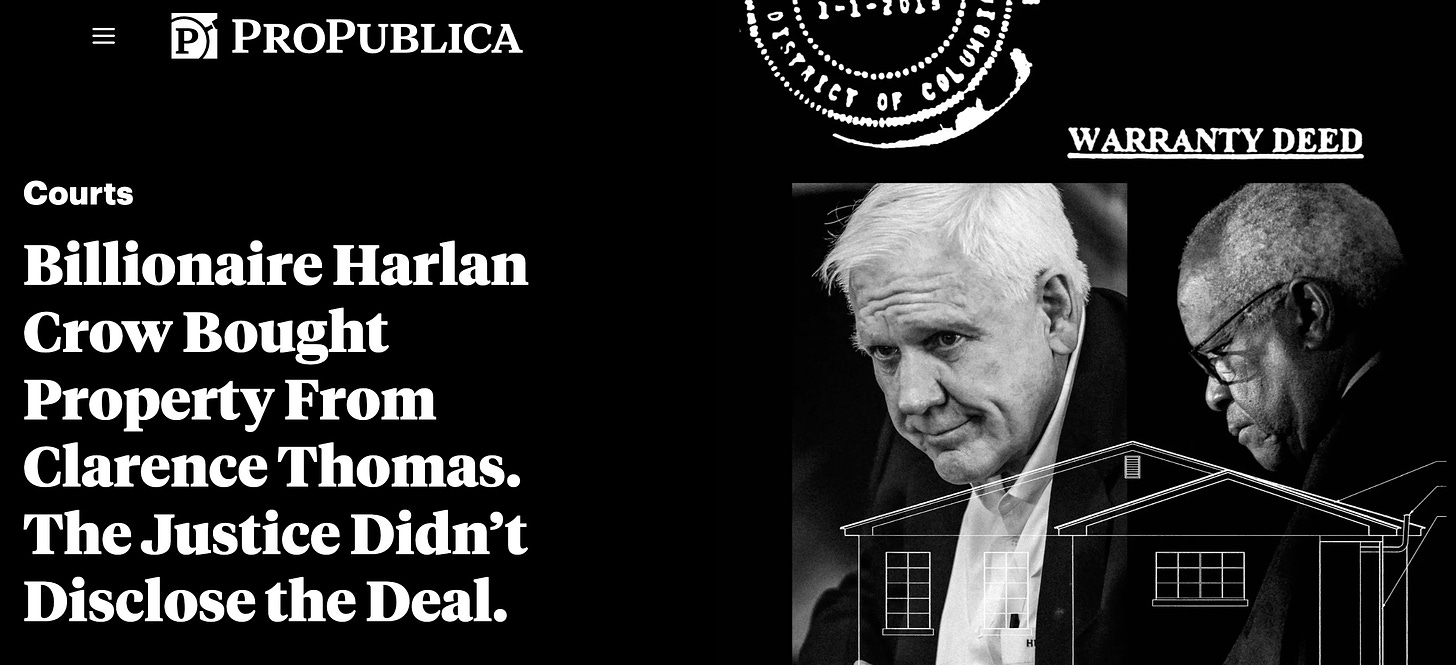
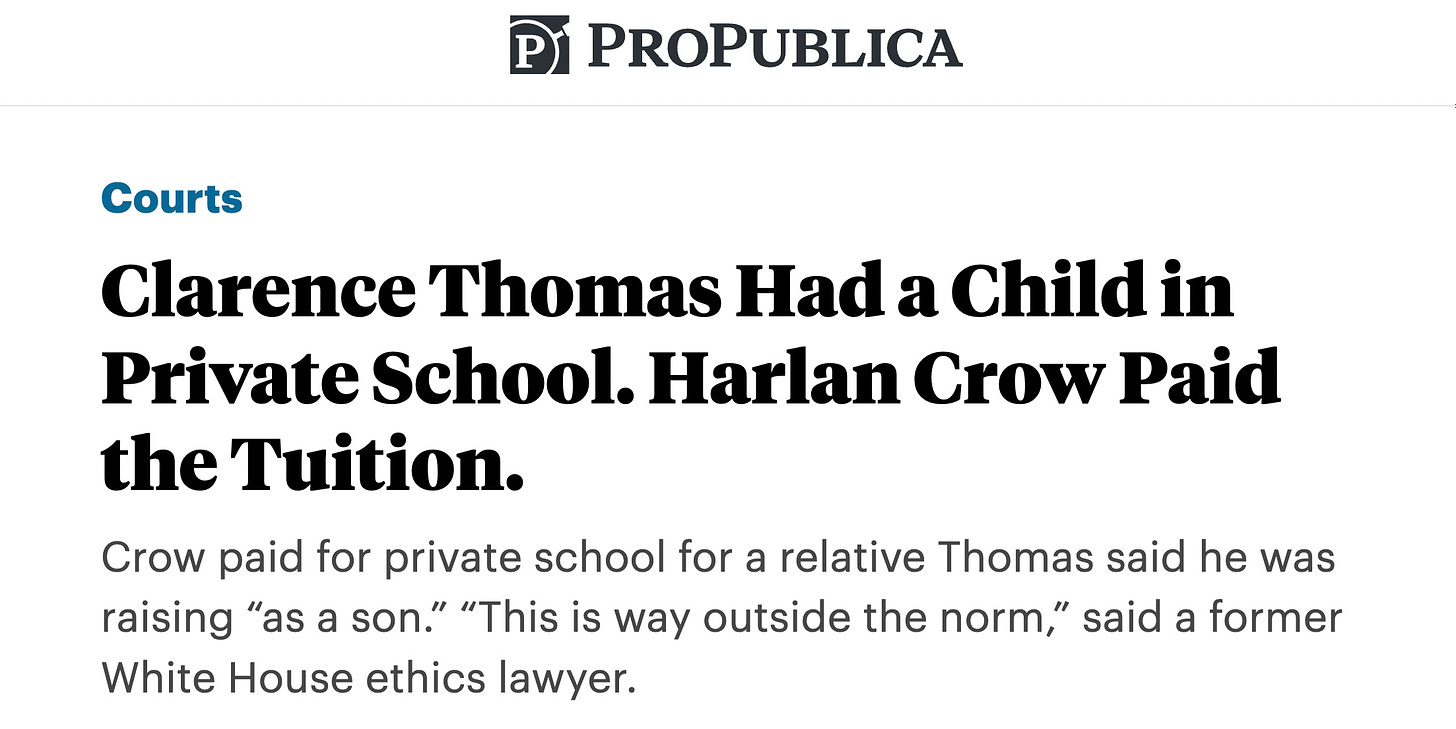
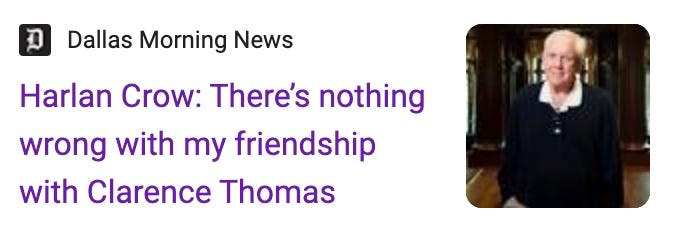
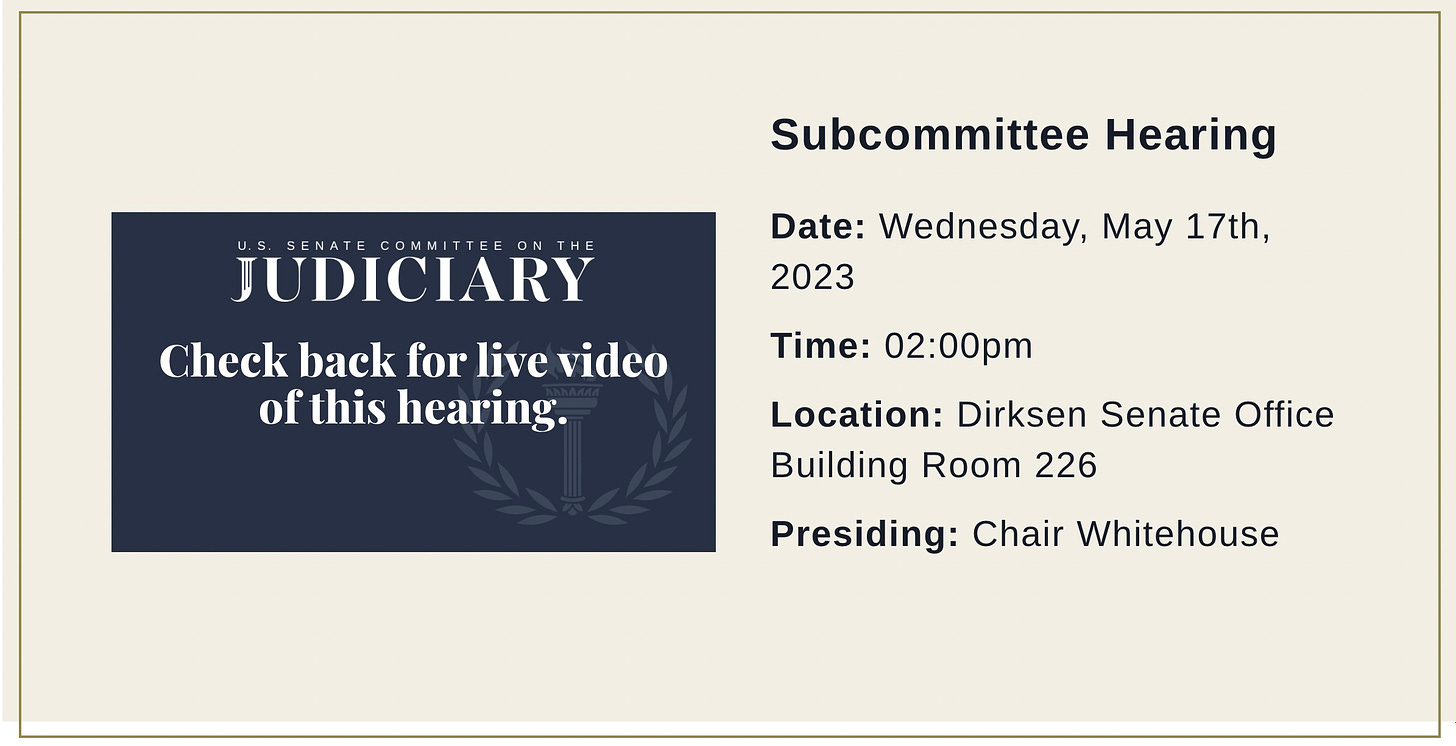

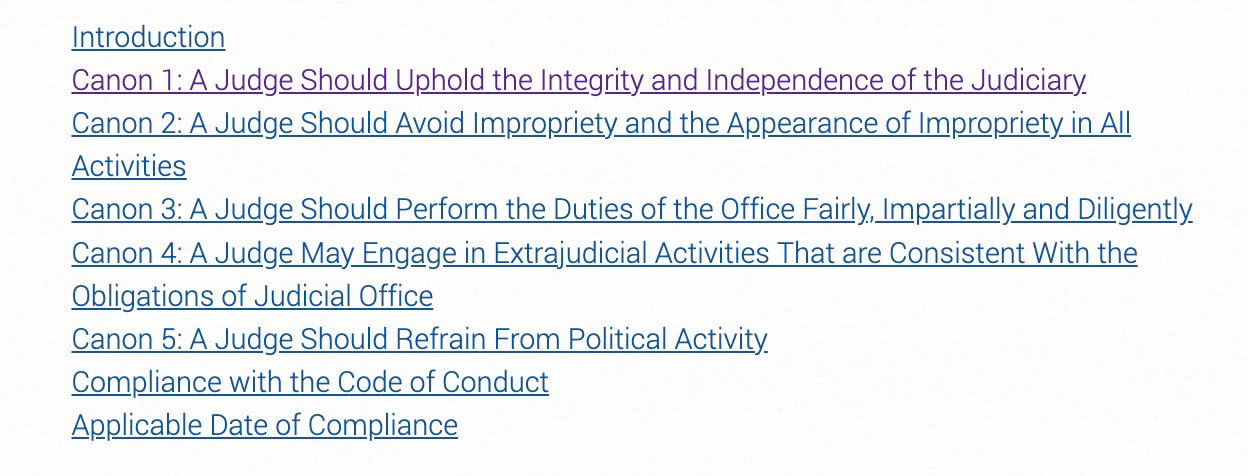
If only we had taken Anita Hill seriously . . .
Lest we forget, a scum, a war criminal, man who should have been charged with crimes against humanity is the same man that should have never been president and was really appointed by the SCOTUS, who should have never heard Gore v Bush, but they did, and George W. Bush became our worst president until Donald J. Trump. That man, that President George W. Bush nominated Thomas. He should have withdrawn his nomination when Thomas's character came into question, but Bush was too busy kissing the ring of the religious right and ultra-right of his party. Besides all that George W. Bush has the I.Q. of a flea.